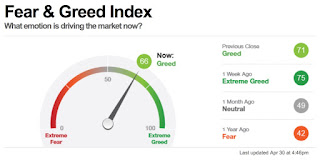Price
Source: dshort blog, Moving Averages: April Month-End Update
Jill Mislinski writes the following summary for this month at the dshort blog:
All three S&P 500 MAs are signaling "invested" and four of five Ivy Portfolio ETFs — Vanguard Total Stock Market ETF (VTI), Vanguard FTSE All-World ETF (VEU), iShares Barclays 7-10 Year Treasury (IEF), and Vanguard REIT Index ETF (VNQ) — are signaling "invested".Momentum investors had another fantastic month. Both VTI and VEU have signaled "invested" rather than "cash" for the third month in a row. Although not one of the Ivy Portfolio asset classes, look at the recent price action of WTI crude as we begin May. Oil prices peaked during the first few days of October 2018 before dropping along with stocks during the correction of 2018. This may indicate momentum is slowing, keep watching the chart.
Sentiment
Source: CNN Business Fear & Greed Index
After briefly reading "Extreme Greed" toward the end of April. the CNN Business Fear & Greed Index ended April at 66, falling into the "Greed" range. The only component reading "Fear" as we start May is "Junk Bond Demand." Categorizing the seven components showed the following readings in early May: 1 "Fear", 2 "Neutral", 3 "Greed" and 1 "Extreme Greed." This index bounced aggressively off the 49 level at the end of March, can it stay above 49 in May?
Valuation
Click on chart to enlarge
Source: Fidelity.com link "Rule of 20" 04/25/2019
Fidelity's Chart of the Week published April 25, 2019 sums up one valuation metric as follows:
Peter Lynch's "Rule of 20"—which states that the stock market is fairly valued when its trailing price-to-earnings ratio plus the inflation rate equals 20—suggests that US equities are broadly valued correctly at present. Looking at data going all the way back to 1954, the sum of the 2 tends to average out to about 20.Morningstar's Market Fair Value gauge ended April at 1.00, showing the same result as the "Rule of 20", the market is neither overvalued or undervalued. Looking at the Price to Sales ratio for the S&P 500 it tells a different story; it currently reads 2.19, close to the high of 2.20 recorded during September 2018. The dshort blog at Advisor Perspectives published two recent updates showing the market remains overvalued: Is the Stock Market Cheap?, Market Remains Overvalued. As I wrote in my June 2017 Update: The biggest issue with valuation data is that it becomes the least important factor as we move closer to the end of bull markets, and significant market returns can happen as an expensive market becomes more expensive.
Summary
The S&P 500 is trading at or near all time highs. Price action is positive for owning stocks, treasuries, and REITs according to the Ivy Portfolio system. Sentiment is a bit greedy. Valuation is still on the high side. With the S&P 500 up 17.51% to start 2019 through the end of April, now is a perfect time to rebalance. Given the S&P 500 advance to start the year, it would be normal for the index to decrease slightly between May through October. The economic expansion in the United States looks like it will set new records in July, so the next few months will likely include more talk about the length of the current U.S. expansion. As we move closer and closer toward euphoria in the market, please stay disciplined. Let's end with quotes from two well known investors:
“In many ways, the stock market is like the weather in that if you don’t like the current conditions all you have to do is wait a while.” - Lou Simpson
"One thing I say to people is if you really don’t think that you can add value—and most people can’t—then I think your base investment case should be a passive product with a low cost." - Lou Simpson
"The individual should act consistently as an investor and not as a speculator.” - Benjamin GrahamAs always, wise investing my friends.
Please consult a qualified financial advisor before making any investment decisions. This blog is for educational purposes only and does NOT constitute individual investment advice.--------------------------------------------------------
Here's what I've been reading and watching recently:
- Vanguard Patented a Way to Avoid Taxes on Mutual Funds (Bloomberg)
- Was The U.S. GDP Report #FakeNews? (Hedgeye)
- The Anatomy of a Market Correction (Visual Capitalist)
- Modern Monetary Nonsense (Project Syndicate)
- Earnings Season Not Adding Up (Schwab)
- Forecasting the Next Recession: How Severe Will the Next Recession Be? (Guggenheim)
- Is this economy too good to be true? (Washington Post)
- Some Reflections on the Bull at 10 (Miller Value Partners)